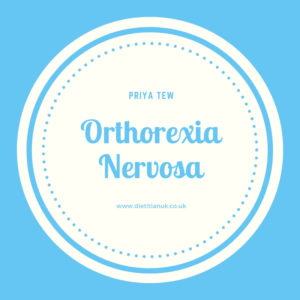Orthorexia Nervosa is the newest eating disorder phrase on the block. It was devised by Steven Bratman in 1996, after he noticed a trend in his patients. Ortho means rich or correct.
Orthorexia = an unhealthy obsession with healthy eating. It can have elements of anxiety disorders and OCD with it.

Whilst there is an overlap here with anorexia nervosa and people with orthorexia may end up developing anorexia, there is also a big difference. Orthorexia is taking healthy eating to the extreme, it has an aspirational, wellness culture ideal associated with it. This means it is less about weight and more about purity and an ideal lifestyle. Social media has certainly heightened this and fuelled it. With role models who life perfect pure lifestyles of food, exercise and spirituality, it can seem as if that ideal is achievable and realistic. Striving to achieve it leads to feelings of failure and guilt.
The Bratman Orthorexia Self-Test
This is a test devised by Steven Bratman to help identify if you are at risk of orthorexia. If you answer YES to ANY of these questions you may be at risk. I think it is useful test to read through and think to how much you identify with the statements.
(1) I spend so much of my life thinking about, choosing and preparing healthy food that it interferes with other dimensions of my life, such as love, creativity, family, friendship, work and school.
(2) When I eat any food I regard to be unhealthy, I feel anxious, guilty, impure, unclean and/or defiled; even to be near such foods disturbs me, and I feel judgmental of others who eat such foods.
(3) My personal sense of peace, happiness, joy, safety and self-esteem is excessively dependent on the purity and rightness of what I eat.
(4) Sometimes I would like to relax my self-imposed “good food” rules for a special occasion, such as a wedding or a meal with family or friends, but I find that I cannot. (Note: If you have a medical condition in which it is unsafe for you to make ANY exception to your diet, then this item does not apply.)
(5) Over time, I have steadily eliminated more foods and expanded my list of food rules in an attempt to maintain or enhance health benefits; sometimes, I may take an existing food theory and add to it with beliefs of my own.
(6) Following my theory of healthy eating has caused me to lose more weight than most people would say is good for me, or has caused other signs of malnutrition such as hair loss, loss of menstruation or skin problems.
If you identify with anything in this post then I highly recommend that you reach out to your medical team, GP, a friend, a parent, a dietitian who works in this field like myself. You can also contact B-Eat.
Top tips for Orthorexia:
Here are some steps you can take to help combat Orthorexia, I suggest these are done with the support of a therapist and dietitian.
- Unfollow anyone on social media who fuels the thoughts of having to eat a pure diet/lifestyle. Or try a social media detox for a week.
- Focus on eating a variety diet. There are no wrong or right foods it is all about the balance and variety that you eat. Nothing is off limits. Nothing is wrong to eat.
- Work with someone qualified in this area to redefine healthy for you. This may include food, movement, quiet space, social time, family time.
- Develop alternative coping skills. Can you see how food helps you feel in control and also makes you anxious? Using distraction after a meal and journalling your thoughts can be a good initial step.
- Write out a list of your food rules/beliefs. These need to be challenged.
- Only allow yourself to get your nutrition knowledge from someone with a minimum of a degree in nutrition – a registered nutritionist or dietitian.
- Stop tracking your nutrition. This may take time to do so start with doing it at one meal at a time.